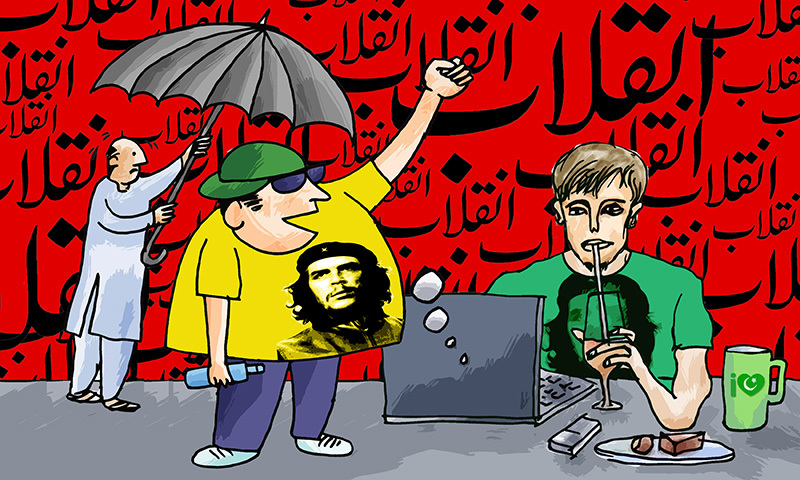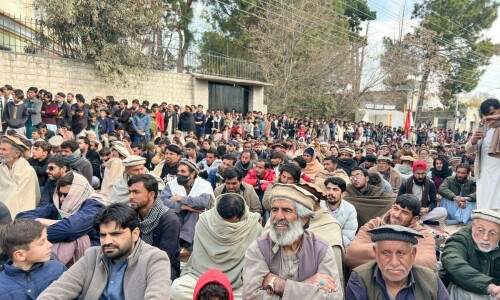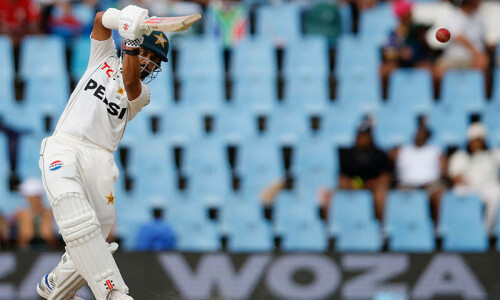This August, tens of thousands of Pakistanis have marched to the federal capital in the name of inquilab – revolution – a word so frequently used by political leaders in their public statements as well as people active on social media, it feels like it has lost all meaning. But what exactly does ‘revolution’ mean?
The past century has proven time and again that most revolutions that occurred all over the world have not led to democratic and responsible leadership but simply a transfer of power — more often repressive than not. However, Pakistanis seem to have a more utopian idea of what may be achieved through ‘revolution’.
The Herald invited writers and scholars, well versed in history and political science to share what they believe a revolution in Pakistan means.
Progressive change for social justice and equality
 |
| Supporters of Pakistan Tehreek-i-Insaf cheer joyfully at the Azaadi march in Islamabad. - Reuters |
By Kavita Khory
I find myself both mesmerised by the images of exuberant women, men and children, camped out on the streets of Islamabad, and fatigued by the endless and essentially meaningless exhortations of ‘revolution’ and ‘freedom’ by men who promise a ‘naya’ Pakistan, but whose words and actions represent a regressive, personality-driven politics, rooted in precisely the power structure they decry day after day.
Revolution, like freedom, means different things to different people. We are inspired by soaring promises of radical change and repulsed by its worst excesses. Progressive change for social justice and economic equality requires a unifying vision that is genuinely inclusive and transcends the deadly identity politics that have plagued Pakistan for more than a generation.
Meaningful change calls for credible leadership and organisations, capable not only of mobilising vast numbers of disaffected citizens but of governing when given the opportunity to do so. Structural change of the sort many Pakistanis yearn for needs representative and democratic institutions at all levels of society, beginning with the political parties and organisations that seek the overthrow of a democratically elected but increasingly unpopular government.
Pakistan Tehreek-i-Insaf chief Imran Khan and leader of the Pakistan Awami Tehreek, Tahirul Qadri, have no doubt tapped into the frustration and anger of ordinary Pakistanis, particularly young people growing up in a militarised society, wrecked by political violence and governed by elites who seem incapable of addressing even the most basic needs of a vast majority of the population. But Khan and Qadri offer nothing new.
Recycled clichés and bankrupt ideologies cannot substitute for the courage and vision necessary for tackling the economic and security challenges facing Pakistan.
In all the coverage of the protests, I am struck by a single split-screen image of Imran Khan strutting on stage, surrounded by male advisers, as throngs of adulating female fans, faces painted in the colours of the PTI, cheer him on — a scene reminiscent of a cricket match, but hardly the stuff of revolutions.
—Kavita Khory is a professor of politics at Mount Holyoke College in Massachusetts, US
Revolutions sweep away the old order
 |
| Lamartine in front of the Town Hall of Paris rejects the Red Flag, 25 February 1848, by French artist Henri Fellix Emmanuel Philippoteaux. |
By Anjum Altaf
In Pakistan, revolution is confused with revolt. A revolution sweeps away the old order; a revolt just replaces the faces at the top. As we have discovered, a revolt is not enough. No matter how often the system is restarted by new saviours, it converges to the same outcome that is compatible with the attributes of the old order.
The principal attribute of the old order is stark social inequality, in which the majority is dependent on a tiny minority for access to services and basic rights. This kind of hierarchical order is compatible with patron-client forms of governance which is really what we have had in the guise of democracy. Everything we observe confirms that our rulers consider themselves monarchs while the ruled think of themselves as subjects.
Years ago, I asked a peasant why they did not elect an honest representative instead of the incumbent criminal. He took about a second to pose a counter question: Would the honest person be able to get his son out of police lock-up or employed in public service? People are not stupid — they understand well the distribution of power in which they have to survive.
A revolution would transform subjects into sovereign citizens, monarchs into accountable representatives. This kind of revolution has yet to take place in Pakistan. The political order has not changed; the departing British left the reins in the hands of the same social class that held power under it.
Is a revolution a la the French Revolution possible in Pakistan?
No, because there is no intellectual ferment that accompanies and energises systemic change. Adrift between faith in divine providence and charismatic saviours, Pakistan seems set to follow its pied pipers into anarchy and oblivion.
Anjum Altaf is dean of the School of Humanities and Social Sciences at the Lahore University of Management Sciences
Challenge the political and economic structure
 |
| A supporter of Tahirul Qadri at a PAT rally in Islamabad. - Reuters |
By Mahir Ali
“You say you want a revolution/ Well, you know/ We all want to change the world,” John Lennon announced in 1968, “…But when you talk about destruction/ Don’t you know that you can count me out”.
The Beatle was hedging his bets in a year that witnessed a revolutionary upsurge across most continents, including in Pakistan, where Ayub Khan’s semi-military regime was decidedly running out of steam and faced protests spearheaded by students.
Ayub fancied himself as a revolutionary figure, having assumed power a decade earlier. But neither his entry nor his exit occurred in a revolutionary context. Nor has any subsequent switch of power been characterised as anything more drastic than a coup.
A revolution, after all, entails a fundamental shift not just in the power structure but also in the relations of production. It is a relatively rare occurrence. In a global context, the last such changes to take place were in Iran and Nicaragua 35 years ago. Nothing of that nature appears to be on the horizon in Pakistan.
A worthwhile revolution in Pakistan would challenge the structure not just of political power but also of economic power, the transitionary stage between feudalism and capitalism in which the nation appears to have stalled.
There is little evidence, however, of the kind of political forces capable of effecting such a change.
What is not beyond the scope of possibility is basic change of the fundamentalist variety whereby the existing structures do indeed change, but only to the extent of facilitating faith-based perversities. Given the extent to which the nation has already drifted in that direction in the past three decades, perhaps it would take less than a revolution to complete the Talibanisation of the state. But it would be an unmitigated disaster either way.
Mahir Ali is a columnist and journalist
Revolutionise the concept of revolution
 |
| Supporters of PTI hurl stones in Islamabad, reacting to residents attacking participants of the Azaadi march. - Reuters |
By Mirza Athar Baig
Often accompanied by great violence and suffering but justified in the name of a glorious future, revolution is the paradoxical emergence of a new order from the chaotic disintegration of an older one. Notwithstanding the many philosophical musings on the subject, the simplest and most ostensible trigger behind revolution is the intense desire of the masses for a change.
While necessary, this desire for radical change in society is not a sufficient condition for revolution. Indeed, a failure to see this distinction opens the field to the shenanigans of political charlatans and pseudo-visionaries, trivialising the notion of revolution for the sake of political expediency. Recent events in our country are a case in point.
In fact, it is widely observed that revolutions – in the classical sense of the ‘great revolutions’ of the past – are no longer tenable. The world as it stands today is a product of revolutionary changes in information technology and its lethal use as a tool to wield ruthless power.
This ‘grand digital narrative’ has given rise to unprecedented forms of ‘hypercolonialism’ — a new management of global space and time, and a remodelling of the dialectics of ‘us’ and ‘them’.
What sort of ‘revolutionary change’ should Pakistan aspire to at this juncture, when, like most other Muslim countries, it has failed to evolve a creative and productive relationship with Western modernity?
The establishment of a renewed relationship – not emotively charged with revolutionary cadence but profoundly transformative still – is the regeneration Pakistan currently requires.
For this to happen, however, the very concept of revolution will have to be revolutionised by liberating society’s creative and cognitive potential and by evolving the indigenous production of knowledge and rewiring our relation between the ‘word and the world.’
Mirza Athar Baig is a writer and teacher of philosophy at Government College Lahore.












































